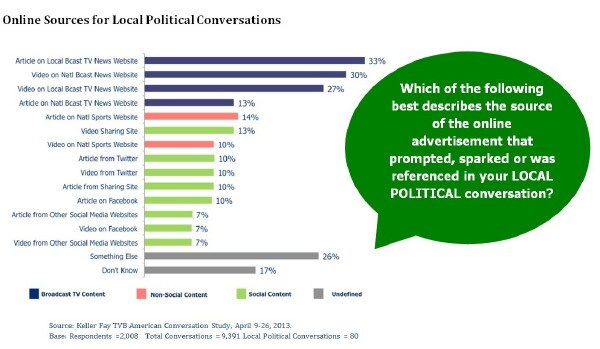People Talking Politics: Local TV Dominates Sources for Political Chat -- Stacey Lynn Schulman

“In religion and politics, people's beliefs and convictions are in almost every case gotten at second-hand.” -- Mark Twain
Twain understood the power of word-of-mouth. Recently, the Supreme Court lifted the aggregate limits on campaign contributions from private individuals, protecting Americans’ right to Free Speech and the ability to financially bolster a political point-of-view. Whether or not you philosophically agree with the Court’s decision, Free Speech is one of our most precious American rights, and we’ve come a long way since the printing press was the most expedient method of disseminating political opinion. The media landscape, growing more complex every day, is a battlefield for attention. So, as we head into the 2014 midterm elections, will the potential increase in media exposure from the Supreme Court’s decision translate into greater voter conversation? If history is a guide, it’s likely.
When it comes to people talking politics, local broadcast television is a significant driver. TVB’s recent study with Keller Fay revealed the following insights about political word-of-mouth:
1) TV is the dominant influencer of local political conversation.
o 61% of respondents referenced television as the media source that sparked their political conversation, outpacing newspapers (24%) and online (21%) by a wide margin;
o When discussing local politics, two-thirds of all respondents claimed to have referenced something they specifically saw on local broadcast television news during their conversation, making local broadcast the leading source of information among television outlets.
2) Digital media may be a reference point for one-fifth of our local political conversations, but it is broadcast TV content in digital channels that truly drive word-of-mouth.
Broadcast television websites accounted for four of the top five sources of digital advertising that prompted, sparked or were referenced in local political conversations, outpacing social media sources by a ratio of 3-to-1.
3) Despite our fascination with social media, it pales in comparison to our face-to-face interactions.
Citizens have the majority (79%) of their Local Political conversations face-to-face compared to online (less than 10%). Social media is a subset of “online” and represents about 4% of all local political conversations captured in the TVB study.

With so much interaction still happening offline, word-of-mouth as a marketing channel should figure more prominently into the lexicon of brand and campaign managers today. Shared physical experiences have powerful effects on our ability to both process and remember information. Several studies have been published in the last decade about the impact of co-viewing and out-of-home viewing on advertising recall, illustrating the benefit of conversation to reinforce brand messaging. So while digital discourse (online chat) attracts much industry attention because of its ability to be easily monitored, face-to-face communication (word-of-mouth) has just recently begun to be explored as a measurable marketing channel.
Why should we care about which media inform political conversation? In a world where attention is becoming our scarcest resource, it is a direct reflection of that medium’s ability to both reach and impact a voter. We often hear about “trust” as a qualitative metric, particularly when it comes to news content. We would submit that, measuring voters’ decisions to reference and share information from a particular media source is a more active embodiment of “trust.” To be referenced, it must first be remembered. But more importantly, if a speaker references something they’ve seen, heard or read in a media channel for the purposes of conversation, that item has a distinct value to them as cultural currency.
Despite the variety of media available to influence voters today, Local Broadcast remains at the center of The American Political Conversation, driving more conversations than any other medium. Candidates, like brands, are seeking to “break through the clutter.” Local Broadcast, in its ability to source conversations throughout the day, creates multiple opportunities daily on air, online and in mobile to reinforce political messaging in the minds of voters -- even in those important decision moments on the way to the voting booth where it matters most.
About the Study
Last April, TVB commissioned “The American Conversation Study” from The Keller Fay Group, a full service marketing research and consulting company dedicated exclusively to word-of-mouth marketing. In an online survey format, 2,011 nationally representative Adults 18+ were asked about their online and offline conversations during the prior day. Respondents answered in-depth questions about up to five different categories of conversation, including what media content or advertising may have “sparked” or informed their conversation. In total, the study captured 9,391 conversations across 18 different categories from “Automotive” to “Weather.” Despite the timing (April), there was enough conversation in the political arena to warrant a preliminary look at how people are talking politics in their day-to-day lives.
For more details about the study, see TVB’s analysis here: http://www.tvb.org/research/2053636/People_Talking_Politics
Stacey Lynn Schulman is Chief Research Officer at TVB, where she is responsible for driving insights and media research thought-leadership about the value of Local Broadcast Television across platforms. Stacey can be reached at Stacey@tvb.org.
Read all Stacey’s MediaBizBloggers commentaries at Local Matters.
Check us out on Facebook at MediaBizBloggers.com
Follow our Twitter updates at @MediaBizBlogger
The opinions and points of view expressed in this commentary are exclusively the views of the author and do not necessarily represent the views of MediaBizBloggers.com management or associated bloggers. MediaBizBloggers is an open thought leadership platform and readers may share their comments and opinions in response to all commentaries.


